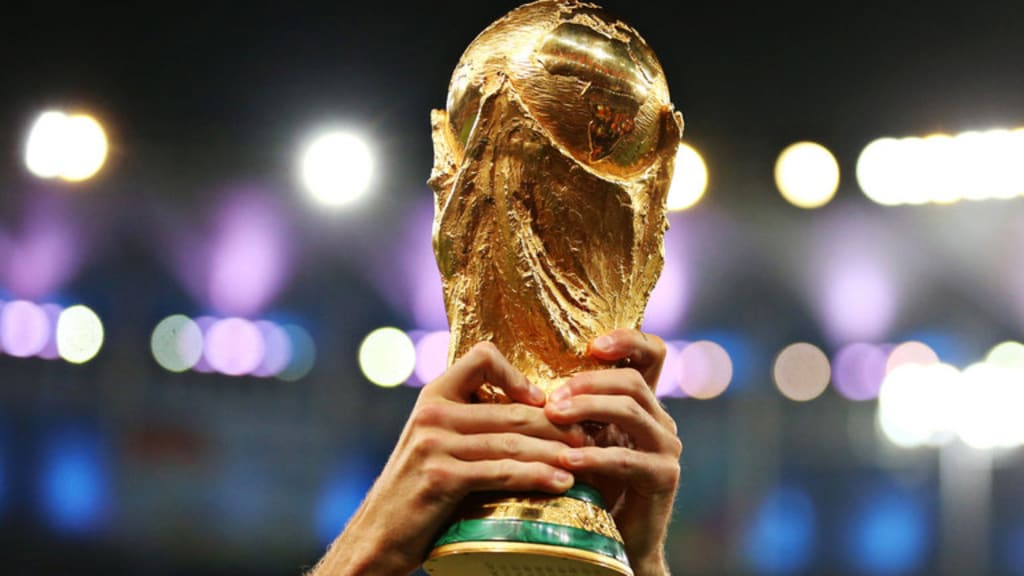Russia 2018
Sports and Politics and How They Collide

We are days away from the 2018 FIFA World Cup. Days away from the tournament that will pit the 32 best teams in the world on one stage competing for soccer hegemony. The stars have aligned and will be on the pitch for competition in the forms of Neymar, Messi, and Ronaldo. The trio of superstars look to provide a spectacle for all to see carrying their respective national team’s flag in hopes of capturing the most coveted prize as the world’s best. In lieu of that pursuit, the politics of sport have taken hold of this prestigious tournament. The setting and the timing of the event look to make this years’ competition one of the most politicized sporting events in decades. Russia as the host city in conjunction with the United States involvement in the bidding for the 2026 World Cup have made this years’ tournament particularly interesting.
Hosting the World Cup is a prestigious opportunity. Inviting athletes, global elite, and onlookers from around the globe is the ultimate in shaping or reshaping one’s global image. In 2014, Brazil hosted the World Cup amid a corruption scandal landing at the top. Protests broke out as the country constructed new stadiums to facilitate the games despite a spiraling financial crisis and much is still to be maligned about the human rights tragedies surrounding the 2022 games in Qatar. The magnitude of the tournament and what it potentially means for the countries that host them is incalculable. In light of recent events, Russia has much to improve on the world stage. The annexation of Crimea in 2014 coupled with the ongoing investigation into Russian meddling in the United States Presidential election the country sits in a peculiar place. They host the World Cup amid sanctions on behalf of the United States, EU, and others due to the Russian military intervention in Ukraine. This ultimately led to the Russian financial crisis. Russia needs the economic impact hosting the World Cup can bring amid sanctions. To put this into perspective, Brazil generated more than 500 million dollars on the 2014 World Cup.
While racism in the sport is an issue throughout Europe, Russia is not new to its share of scandal in this area. Back in October 2013, Yaya Toure endured racist chants from Russian onlookers. It was a spectacle that prompted the star striker to insinuate that black players could boycott the games in 2018. While Vladimir Putin has suggested that racism and hooliganism will not be tolerated, much leads to the contrary. Vyacheslav Koloskov, a member of the Russian bid team and former Vice President of FIFA was quoted as saying that racism in Russia was overplayed in the media and that “monkey chanting” is not racist. Eradicating racism from the sport is something that appears to be at the forefront of FIFA’s agenda moving forward dating back to the “Say No to Racism” campaign in early 2013. However, a new terrain could present new complications. Certainly, the economic benefit of hosting the games would entice the Russians to ensure that a tournament overwhelmed with African and Middle Eastern nations would be free of these incidents.
Understanding the magnitude of hosting the World Cup, the United States has climbed back into the fold. Donald Trump made headlines in May with his push to bring the World Cup to the states in 2026. FIFA will decide between a joint bid from the United States, Canada, and Mexico and a singular request from Morocco later this month. This would be the first time the United States hosted the event since 1994. The bid would spread the host games across the three countries with the round of 16 and beyond being held on American soil. The host city will be announced on June 13 in Moscow. Recent threats from President Trump have taken aback many people in soccer over the last month. Political influence in FIFA bidding is a violation of integrity rules. Whether or not this will impact the bid for the games remains to be seen. Needless to say, it is not a good look.
Getting to the football. The groups are set and the defending champs Germany have been paired in Group F with Mexico, Sweden, and South Korea. After much speculation, Zlatan will not be coming out of retirement. After a recent retirement from international football, the Swedish striker will not compete in this years’ games. Missing from the German side this time around are Miroslav Klose and Philip Lahm, who have both since the previous World Cup retired from international duty. In their absence, Germany will have to depend on the services of young talents like Julian Draxler and proven performers such as Thomas Müller. Mexico has a solid squad but Chicharito will not be enough to out suffer the German side. Germany wins the group.
Probably the biggest story of this years’ World Cup is Brazil. After suffering embarrassment at the hands of the eventual champion Germany on their home front, they will be looking for redemption. New faces such as Gabriel Jesus will likely have a huge impact as well as mainstays Neymar and Coutinho. Defensively, their back four in Marcelo, Thiago Silva, Filipe Luis, and Miranda are more than solid. Willian, Casemiro, and Douglas Costa will round out Brazil’s attacking midfield in this year's field. One dimension that will be missing is Dani Alves and his ability to attack from his right back spot and play as a fourth midfielder. He will miss due to a knee injury. With that said, of the field, Brazil is the most talented side top to bottom. Thus, they are my choice for champions.
The most disappointing storyline of the tournament involves a team that did not qualify. The United States failed to qualify for the World Cup for the first time since 1986. American football has come along way in a very short time. Christian Pulisic presents hope for the future. But a dreadful loss to Trinidad and Tobago derailed their Russia hopes in the present. Given the global positioning of the United States, not having a dog in the fight certainly puts a damper on the games from the American side. With that said the future looks bright with young stars Zardes and Bobby Wood coming through the ranks. Perhaps missing this go around will call for some self-reflection in how the United States can avoid this embarrassment moving forward.
As great as the games are, sports and politics will always intersect, especially in sports that have a global audience. The stakes are simply too high and the intersectionality of society and culture will always clash. Russia 2018 is no exception. The hope is that politics do not overshadow the sporting event itself. The World Cup is the greatest sporting event across all of sports, and that will be on display for the next month. Stars will be made and contracts will be earned throughout the process. In 2014, it was James Rodriguez. Who will capture the hearts of the world this year? The beautiful game will decide.
About the Creator
Enjoyed the story? Support the Creator.
Subscribe for free to receive all their stories in your feed. You could also pledge your support or give them a one-off tip, letting them know you appreciate their work.







Comments
There are no comments for this story
Be the first to respond and start the conversation.